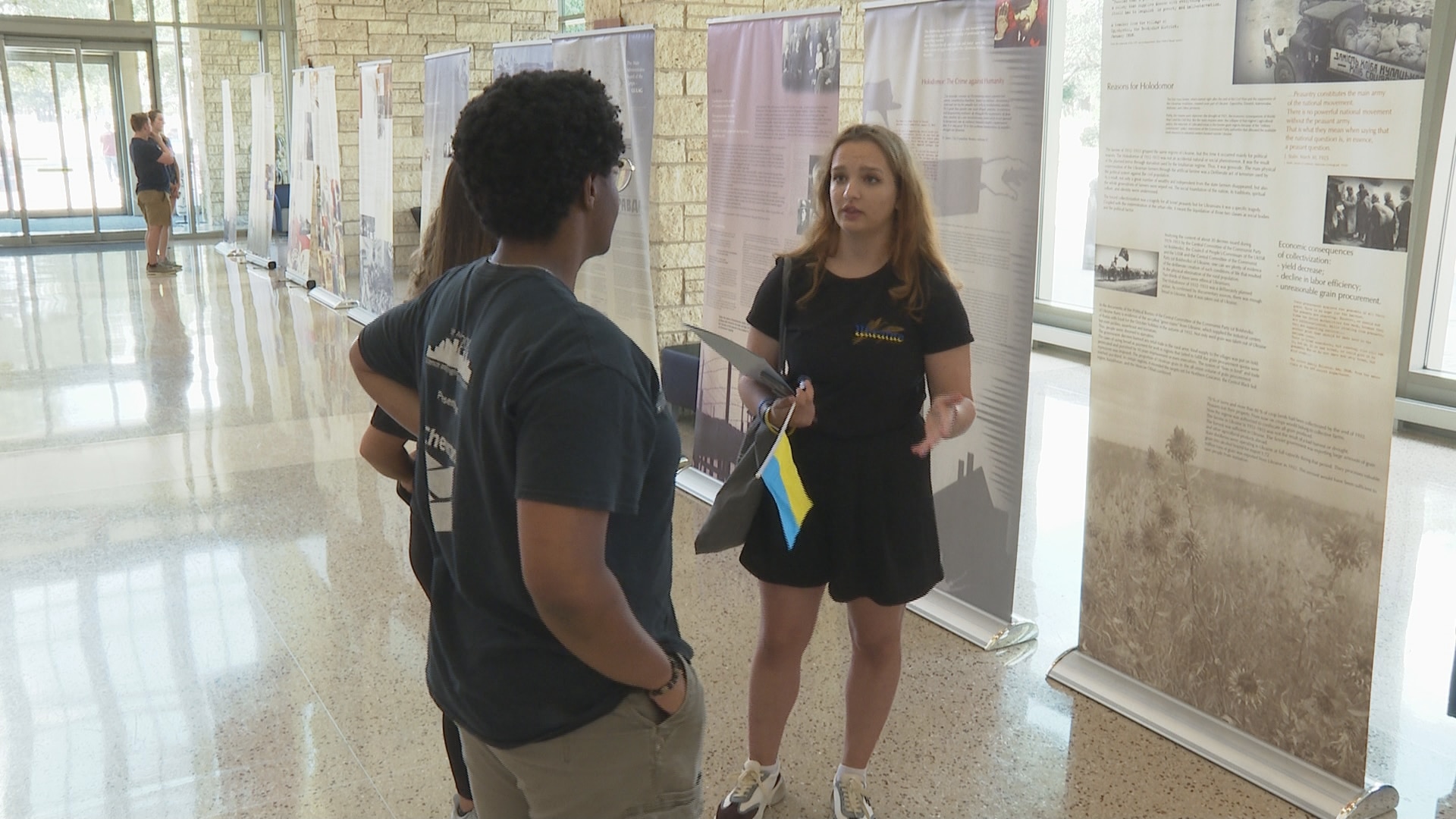Texas A&M Ukrainian Club hosts exposition honoring Ukrainian Genocide
COLLEGE STATION, Texas (KBTX) -The Ukrainian Club at Texas A&M University is currently hosting a week-long exposition dedicated to the genocide of the Ukrainian nation. Located in the 12th Man Hall at the Student Memorial Center on the Texas A&M campus, this exhibit contains 42 informative posters that delve into three historical tragedies: the Holodomor, the Holocaust, and the Gulag.
Informative posters that delve into three historical tragedies: the Holodomor, the Holocaust, and the Gulag. (Donnie Tuggle/Bryan-College Station)
The Holodomor, a term describing the man-made famine that afflicted Soviet Ukraine from 1932 to 1933, is a central focus of this exposition. During this dire period, millions of Ukrainians, predominantly in rural areas, perished due to a combination of factors, including forced collectivization policies, grain requisitioning, and government-imposed food restrictions. While the precise death toll remains debated, it is universally acknowledged as a severe human rights violation and a deliberate act of genocide against the Ukrainian people.
The Holocaust, a somber chapter in human history, is another significant theme of the exhibit. It represents the systematic genocide of approximately six million Jews by Nazi Germany and its collaborators during World War II. The Holocaust involved mass shootings, forced labor camps, and extermination camps where victims were systematically murdered, notably through the use of gas chambers. This atrocity extended its horrors to other groups, including Romani people, disabled individuals, and political dissidents.
The third crucial aspect of the exposition explores the Gulag, a system of forced labor camps in the Soviet Union during Joseph Stalin’s regime, spanning from the 1930s to the 1950s. These camps held millions of political prisoners, criminals, and individuals perceived as enemies of the state. Conditions within the Gulag were harsh, characterized by forced labor, inadequate sustenance, and brutal treatment, resulting in significant loss of life. The enduring impact of the Gulag system left an indelible mark on Soviet society.
Daar Foundation Executive Board Member and founding member Michael Blayzer speaking with cadets at the event. (Donnie Tuggle/Bryan-College Station)
Sponsored by the Daar Foundation, this exhibit serves as a platform for raising awareness and providing humanitarian aid to address the ongoing refugee crisis. With a particular focus on supporting Ukrainians still residing in conflict zones, the Daar Foundation leverages its extensive networks and Ukrainian-American heritage, specifically rooted in the Kharkiv region. For over two decades, the Daar Charitable Foundation has remained dedicated to Ukraine, operating as a U.S.-based nonprofit.
Organizers stress the significance of preserving the memory of these pivotal historical events that have profoundly shaped the historical consciousness of affected regions and the global community.
“I think it’s just important to know about the slaughter of people, of innocent people, of civilians that were just living their life in Ukraine, and they were killed just because they were Ukrainian or just because they were Jews,” remarked Natalya Kolomiyets, Vice President of the Ukrainian Club at Texas A&M University.
The Consul General of Ukraine Vitalii Tarasiuk with Natalya Kolomiyets, Vice President of the Ukrainian Club at Texas A&M University. (Donnie Tuggle/Bryan-College Station)
“This shall never happen again. The only way you can prevent horrible things from happening again is by spreading this knowledge through education, by explaining, and by showing people what happened in the past,” said Daar Foundation Executive Board Member and founding member Michael Blayzer.
Vitalii Tarasiuk, the Consul General of Ukraine was also in attendance to inaugurate this significant event. The exhibit will remain on display until Friday, September 22, 2023.







